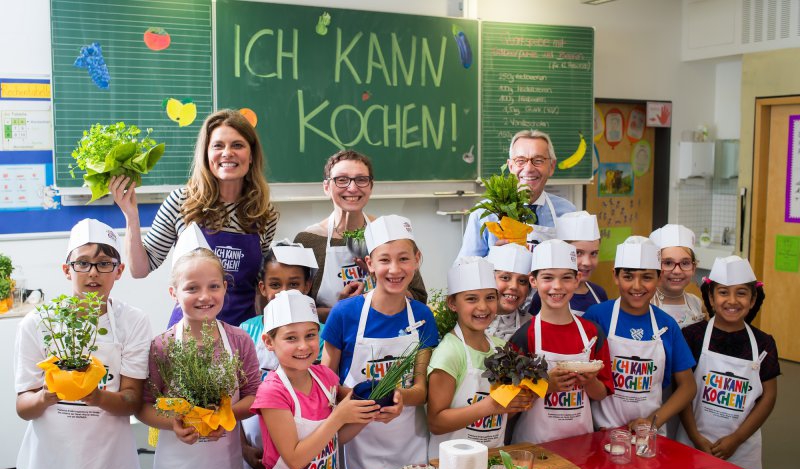Today I participated in a continuing education training with the organisation, ‘Ich Kann Kochen!’ They are a Berlin-based initiative that aims to get school children into the kitchen and cooking! Not only that, but their projects help children to build a healthy relationship with food, a curiosity to learn where their food comes from, develop healthy habits, and how to cook healthy, fun, and delicious snacks. The training reminded me of the work I did in New York City with the organization, Wellness in the Schools, which brings nutrition education and healthy, naturally cooked meals into inner city public schools. I am so happy to continue this important and inspiring work while I am living in Germany!

(here I am in 2014 teaching a cooking workshop on 'applesauce and oatmeal' to a public elementary school in New York City)
The training was totally free to participate in. The initiative is sponsored by a major German health insurance company, Barmer. Because I work with children, I was able to register for the training. The training model is a ‘train the trainer’ concept, meaning anyone who works with children or in the field of education can participate, and we receive the tools and resources necessary to implement these projects in our schools. After the training, we are even eligible to receive a 500 euro financial allowance from the health insurance company to pay for project costs. Cool, right!?
It was very interesting to get a different perspective regarding Germany’s food culture and how their food system is organized. For example, the German educational model of the ‘food pyramid’ is completely different than the US model. Despite the differences, what I did realize is that the enjoyment of food and the creativity and fun involved are at the forefront when educating children. If the food doesn’t taste good, the kids won’t care about its nutritional value, quality, cost, etc. Taste is everything! Children are drawn to sweet tasting foods and dairy products (as their first feeding was from the mother’s sweet breast milk), and they are drawn away from green colored foods as it reminds them of plants in nature which can be bitter or poisonous. That makes sense!
We spent most of the training learning and discussing the theory of how to educate children about food and then we practiced making the suggested recipes in the kitchen and enjoyed a community feast together. We were able to share ideas, brainstorm, and learn from each other based on our experiences working with children.

(learning educational theory)


(putting theory into practice)

(mindful eating activity with different bread varieties)
It was nice for me to meet some German teachers in the public school system, as I am working in the private industry. I learned some new cultural insights when we did a ‘mindful eating’ activity with different breads. The instructor had five different German bread assortments and we had to discuss our experience with each type, and use our senses to develop a relationship with the bread. Who knew there is an ‘Urlaubsbrot (fancy unhealthy white bread),’ ‘Alltagsbrot (bread you eat all day in any case), ‘Kinderbrot or Schwangerenbrot (bread that packs easily and is easily prepared),’ and ‘Stress or Notfallbrot (emergency bread for when the stores are closed or you don’t have time to go to the bakery). There is no ‘bread culture’ in the US. We basically have ‘white or wheat’, and that’s it. See, we can learn much from the Germans!
All in all, I would definitely recommend this training to anyone who works with children. If you are interested in the Slow Food Movement, health promotion, disease prevention, and nutrition education, this training is very practical. Connecting children with our food system is so important in our modern world full of fast food and delivery-processed food systems. Check out their website to learn more about their training programs.



2 thoughts on “Kids in the Kitchen!”
Sounds nice!!
A big thank you for your blog post. Really thank you! Really Cool. Venus Elisha Monique